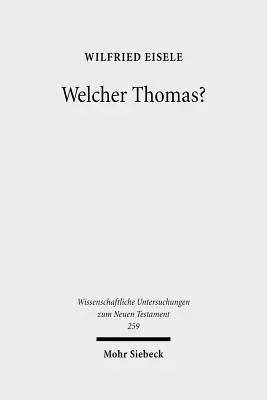English summary: The Gospel of Thomas does not tell the story of
Jesus' life; it presents itself as a loose compilation of words from his
mouth. In it, the individual statements are isolated texts without the
context necessary to study the interpretation of individual sayings.
Nevertheless, in order to be able to deal with the text, there has been
an increase in the development of approaches to a composition and
redaction history of the Gospel of Thomas recently. However, those doing
so neglected the fact that we have two versions of a whole range of the
sayings in the Gospel of Thomas, and that these differ considerably.
Wilfried Eisele studies these sayings, taking the Coptic text from Nag
Hammadi and the Greek fragments from Oxyrhynchos seriously as
independent text forms. The result is a number of interesting insights
into the structures of the history of the text and the tradition of the
Gospel of Thomas. German description: Das Thomasevangelium erzahlt
nicht das Leben Jesu, sondern prasentiert sich als lose Sammlung von
Worten aus seinem Munde. Die einzelnen Spruche begegnen darin als
isolierte Texte ohne den notigen Kontext, an dem sich die Deutung
einzelner Logien kontrollieren liesse. Um den Text dennoch zu
entschlusseln, wurden in neuerer Zeit verstarkt Ansatze fur eine
Kompositions- und Redaktionsgeschichte des Thomasevangeliums entwickelt.
Dabei wurde jedoch vernachlassigt, dass wir von einer ganzen Reihe von
Thomaslogien zwei Fassungen besitzen, die sich zum Teil erheblich
voneinander unterscheiden. Wilfried Eisele untersucht diese Logien und
nimmt dabei den koptischen Text aus Nag Hammadi und die griechischen
Fragmente aus Oxyrhynchos als eigenstandige Textformen ernst. Daraus
ergeben sich interessante Einblicke in die Strukturen der Text- und
Uberlieferungsgeschichte des Thomasevangeliums.

